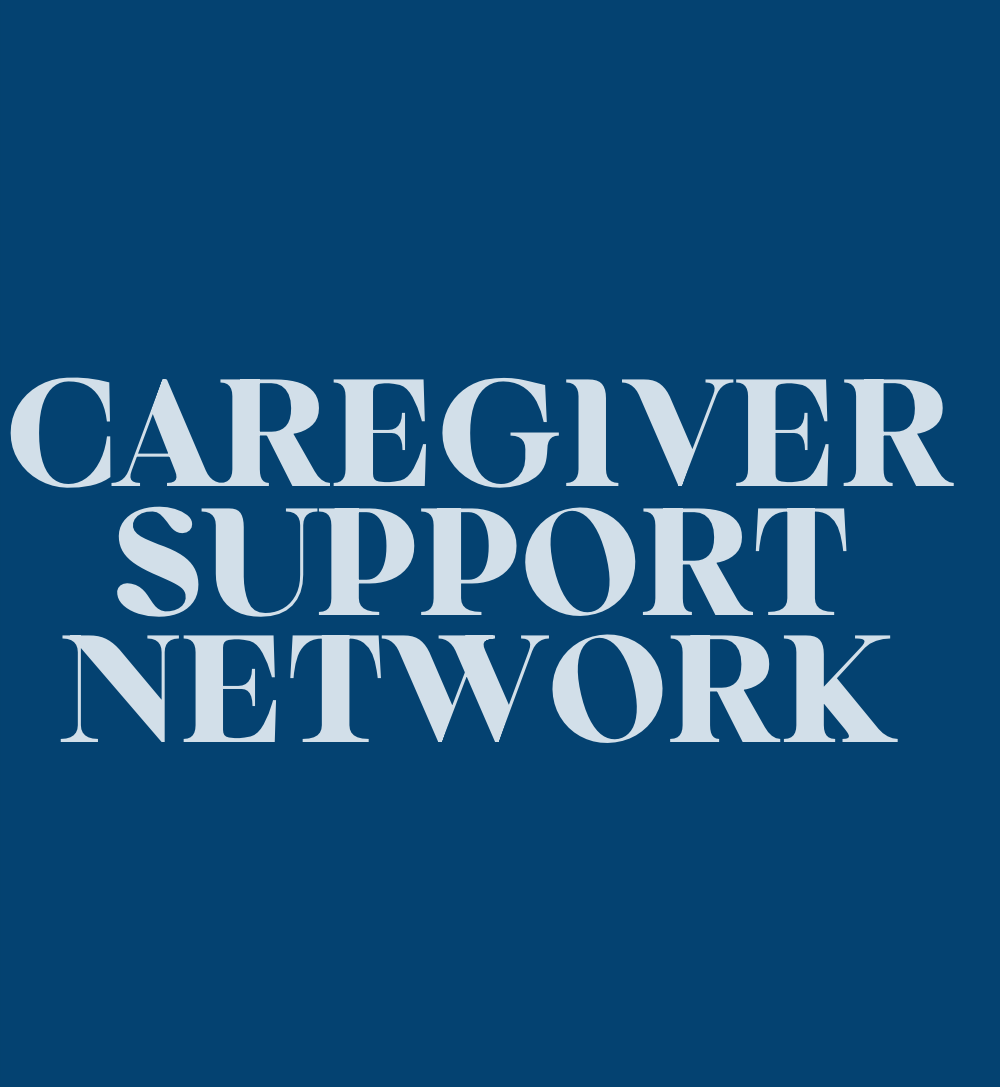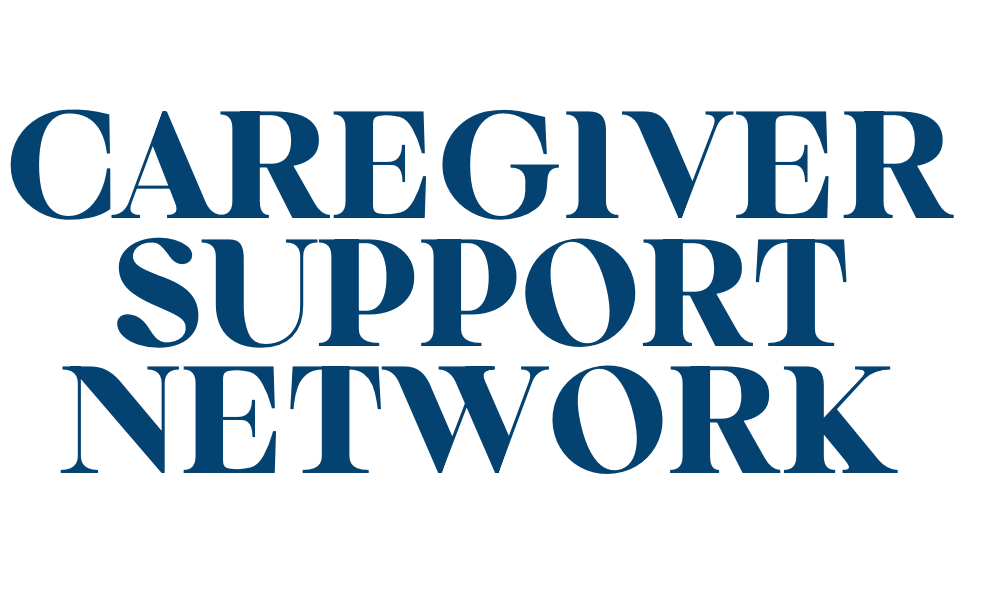Legal
When Does a Living Will Go Into Effect?
Prepare for crucial decisions by understanding the pivotal moment when a living will springs into action, shaping end-of-life choices in a profound way.

Reflecting on the circumstances under which a living will takes effect, it’s common to wonder about the particular scenarios that activate this critical document.
The criteria for when a living will becomes effective are critical aspects that impact end-of-life decisions.
Understanding the triggers and legal requirements surrounding the activation of a living will can provide insight into ensuring that one's wishes are honored when the time comes.
Let's explore the nuances of this significant document and how its implementation can profoundly influence healthcare decisions during critical moments.
Key Takeaways
- Doctor's certification triggers living will.
- Healthcare proxy ensures medical preferences.
- Activation requires irreversible conditions certification.
- Living will guides treatment during terminal illness.
Legal Conditions for Activation
In order for a living will to become effective, it necessitates a medical professional's confirmation of the individual's terminal illness or permanent unconsciousness. The activation of a living will hinges on a doctor certifying that the individual is incapacitated and unable to make medical decisions.
This crucial step ensures that the individual's predetermined preferences regarding their medical care are upheld when they're no longer able to communicate their wishes. Legal conditions surrounding the activation of a living will are in place to safeguard that the individual's directives are followed precisely as outlined in the document.
Therefore, the role of the medical professional in certifying the individual's condition is paramount in initiating the activation of the living will. By meeting these stringent legal conditions, the living will can effectively guide the individual's healthcare decisions when they're most in need of assistance and unable to articulate their preferences.
Healthcare Proxy's Role

Assuming the critical responsibility of overseeing medical decisions in alignment with the directives of the living will, the healthcare proxy diligently ensures adherence to the individual's predetermined healthcare preferences. The role of the healthcare proxy is pivotal in guaranteeing that the individual's wishes regarding medical care and end-of-life decisions are respected and followed through effectively. Here are three essential aspects of the healthcare proxy's role:
- Advocating for Medical Preferences: The healthcare proxy acts as a staunch advocate for the individual, ensuring that medical decisions align with the preferences outlined in the living will.
- Trustworthiness and Capability: It's imperative that the appointed healthcare proxy is someone trustworthy, capable of making challenging decisions, and well-versed in the individual's medical preferences to provide comprehensive care.
- Effective Communication: The healthcare proxy must effectively communicate the individual's wishes to healthcare providers, ensuring that end-of-life care is administered according to the predetermined directives, promoting peace of mind and dignity for the individual.
Decision-Making Triggers

Activation of the living will is triggered upon certification of terminal illness by a doctor. This certification indicates that the individual is facing a condition that's irreversible and likely to result in death.
Furthermore, the living will comes into effect when the person is in a vegetative state or permanent unconsciousness, rendering them unable to participate in making medical decisions. It's crucial that the doctor certifies both the terminal illness and the individual's inability to make decisions for the living will to be activated.
This process ensures that the individual's wishes, as outlined in the living will, are respected and carried out appropriately. The implementation of the living will hinges upon the healthcare provider's confirmation of the individual's medical condition and decision-making capacity, emphasizing the importance of medical expertise in the activation of such legal documents.
Impact of Incapacity

Upon determination of the individual's incapacity by a medical professional, the living will is activated to ensure adherence to the outlined end-of-life medical preferences. When faced with the impact of incapacity, several crucial aspects come into play:
- Clarity in Medical Decision-Making: Incapacity necessitates a clear understanding of the individual's end-of-life wishes, ensuring that medical decisions align with their preferences even when they can't express them.
- Respecting Terminal Illness: In moments of terminal illness, the living will serves as a guiding light, guaranteeing that the person's desires regarding treatment and care are respected with dignity and compassion.
- Relief in Implementation: The living will provides relief to both the individual and their loved ones by ensuring that medical interventions are in line with their predetermined preferences, easing the burden of difficult end-of-life decisions.
Through certification of incapacity, the living will serves as a beacon of certainty in uncertain times, offering solace and assurance in honoring one's wishes.
Activation Process
When a medical professional certifies an individual as terminally ill, the living will is activated to govern adherence to the specified end-of-life medical preferences. This activation process is crucial in ensuring that the individual's wishes are followed when they're unable to make medical decisions themselves.
The living will comes into effect when the individual is in a vegetative state or permanently unconscious, as confirmed by a doctor's certification. It's important to note that the living will isn't self-activating; it requires medical confirmation and validation by a healthcare provider for implementation.
This stringent process guarantees that the individual's predetermined medical choices are respected and carried out appropriately. By adhering to the activation requirements outlined in the living will, healthcare professionals can provide care in accordance with the individual's expressed preferences, even in situations where the individual is incapacitated and unable to communicate their wishes directly.
Frequently Asked Questions
What Is the Main Disadvantage of a Living Will?
When addressing the main disadvantage of a living will, it's crucial to consider its limitation in providing immediate guidance on medical decisions until the individual becomes incapacitated. The delay in its activation may result in conflicts or uncertainties regarding the person's medical care.
This drawback highlights the need for alternative planning or communication methods to ensure timely and accurate healthcare choices.
How Powerful Is a Living Will?
When discussing how powerful a living will is, it's important to highlight its ability to assert one's medical decisions when they're incapacitated. This legal document ensures that our end-of-life preferences are respected, providing clarity amidst difficult times.
With a doctor's certification, a living will becomes potent in safeguarding our wishes, eliminating uncertainties for our loved ones. Its strength lies in ensuring our autonomy and dignity, even when we're unable to speak for ourselves.
What Qualifies as a Living Will?
When discussing what qualifies as a living will, it's essential to understand that it's a legal document that outlines an individual's healthcare preferences in case they become unable to make decisions for themselves.
This document typically covers scenarios like end-of-life care and specifies the type of medical treatments one wishes to receive or avoid.
It's crucial to have this document in place to ensure one's wishes are respected during times of incapacity.
Is a Living Will Not Legally Binding?
We assure you that a living will is indeed legally binding. It serves as a crucial document that directs medical care in situations where individuals are unable to communicate their wishes.
Once properly executed, a living will ensures that healthcare providers follow the specified instructions. This legal tool provides peace of mind to both the individual and their loved ones by clearly outlining end-of-life medical preferences.
Conclusion
In conclusion, the activation of a living will occurs under specific legal conditions when deemed necessary by healthcare professionals.
The role of a healthcare proxy is crucial in ensuring the individual's medical preferences are upheld.
Decision-making triggers prompt the implementation of the living will, emphasizing the importance of preparedness for potential incapacity.
The activation process requires careful consideration and adherence to legal requirements to protect the individual's end-of-life care wishes.
Albert brings a wealth of knowledge and expertise to our writing team. With a background in caregiving and a deep understanding of the challenges faced by caregivers, Albert’s writing resonates with authenticity and empathy. He is committed to delivering high-quality content that empowers and supports caregivers on their journey.
Legal
Eligibility Criteria for Medicare Explained
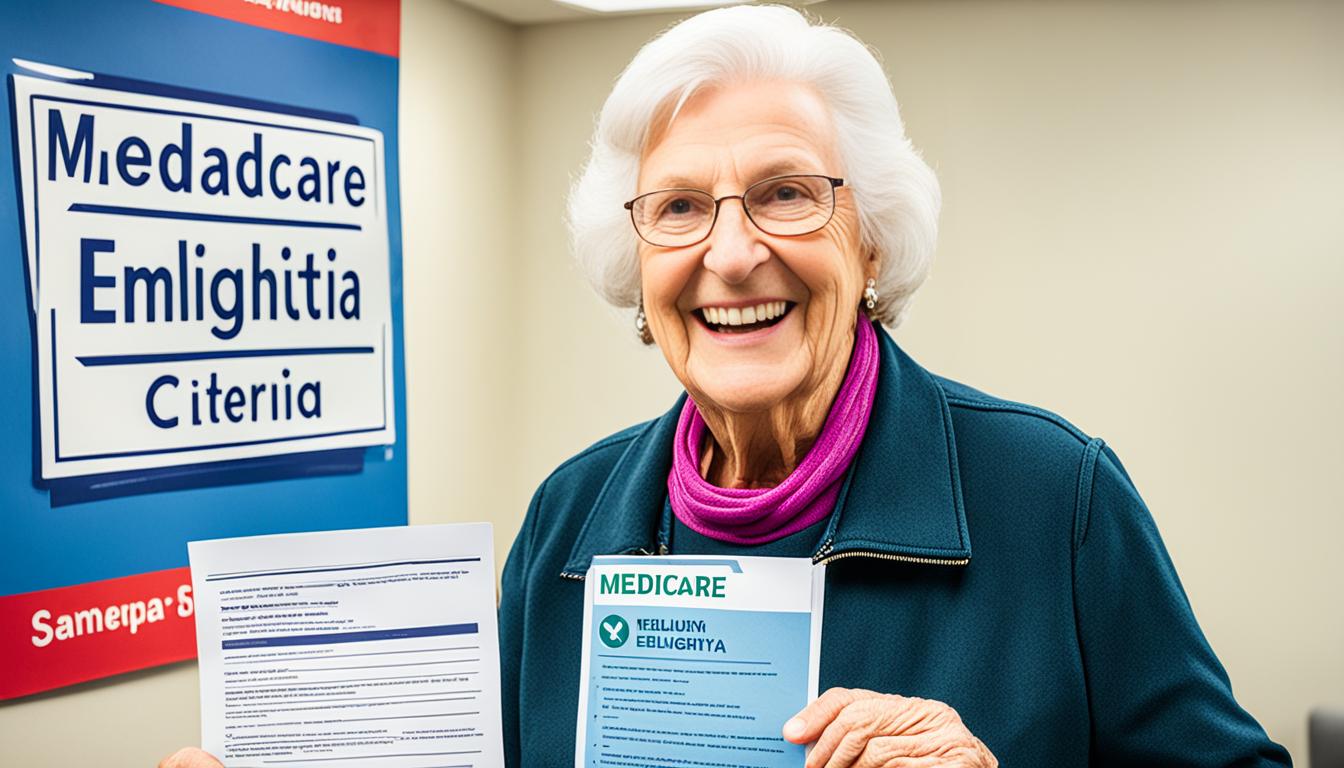
Did you know that Medicare provides healthcare coverage for more than 62 million Americans? This represents a significant portion of the population relying on this program for essential medical services and care. If you’re approaching the age of 65, living with a disability, or facing a serious health condition, understanding the eligibility requirements for Medicare is crucial to ensuring that you have access to the care you need.
Key Takeaways:
- Medicare is available to individuals who are 65 or older, have a disability, End-Stage Renal Disease (ESRD), or Amyotrophic Lateral Sclerosis (ALS).
- Part A of Medicare is usually premium-free, while Part B requires a monthly premium.
- Part C (Medicare Advantage) and Part D (prescription drug coverage) have varying premiums and eligibility criteria.
- Understanding the eligibility requirements for each part of Medicare is essential in making informed decisions about enrollment and coverage options.
- Special considerations and factors, such as employer-sponsored coverage and health status, can impact Medicare eligibility.
Who is Eligible for Medicare at Age 65?
When it comes to Medicare, turning 65 is a significant milestone. At this age, individuals become eligible for Medicare coverage, providing them with essential healthcare benefits. However, it’s important to understand the eligibility criteria and qualifications for Medicare at age 65.
Medicare eligibility age: The Medicare eligibility age is 65 years for most people. This means that individuals who are 65 or older automatically qualify for Medicare coverage.
Medicare qualifications: In addition to the age requirement, individuals may also be eligible for Medicare if they are receiving or eligible to receive Social Security or Railroad Retirement Board benefits. These benefits can include retirement, disability, or survivor benefits.
It’s crucial to note that age alone does not guarantee eligibility for Medicare. Meeting the other eligibility criteria, such as receiving Social Security or Railroad Retirement Board benefits, is equally important. Understanding these requirements is essential to ensure a smooth enrollment process and access to the healthcare benefits provided by Medicare.
“Turning 65 is a significant milestone for Medicare eligibility. However, meeting the age requirement alone is not enough. It’s important to understand the other qualifications for Medicare, such as receiving Social Security or Railroad Retirement Board benefits.”
To summarize, individuals who are 65 years or older and receiving or eligible to receive Social Security or Railroad Retirement Board benefits are generally eligible for Medicare. By meeting these requirements, individuals can access the comprehensive healthcare coverage offered by Medicare.
Medicare Eligibility for Individuals with Disabilities
Individuals with disabilities can qualify for Medicare if they have been receiving Social Security Disability Insurance (SSDI) benefits for at least two years. Medicare eligibility for individuals with disabilities is determined by the Social Security Administration based on their definition of disability. It is important for individuals with disabilities to understand the process of enrolling in Medicare and the specific eligibility requirements.

Qualifying for Medicare with Disabilities
Medicare eligibility for individuals with disabilities is based on the receipt of Social Security Disability Insurance (SSDI) benefits. To qualify for Medicare, individuals must meet the following criteria:
- Have a qualifying disability as defined by the Social Security Administration.
- Have received SSDI benefits for at least two years.
It is important to note that individuals with certain disabilities, such as Amyotrophic Lateral Sclerosis (ALS) or End-Stage Renal Disease (ESRD), may be eligible for Medicare before the two-year waiting period.
Enrolling in Medicare with Disabilities
Enrolling in Medicare with disabilities follows a similar process as for individuals who are 65 years or older. Here are the key steps to take:
- Contact the Social Security Administration to determine eligibility and begin the enrollment process.
- Provide the necessary documentation, including proof of disability and SSDI benefits.
- Complete the Medicare enrollment application, either online, by phone, or in person.
- Review and understand the specific Medicare eligibility guidelines for individuals with disabilities.
Understanding Medicare Coverage for Individuals with Disabilities
Medicare provides essential healthcare coverage for individuals with disabilities. Once enrolled, individuals with disabilities have access to the same Medicare parts and benefits as those who are 65 or older. This includes Medicare Part A, Part B, Part C (Medicare Advantage), and Part D (prescription drug coverage).
It is important for individuals with disabilities to review their Medicare coverage options and understand any additional programs or assistance available, such as Medicare Savings Programs or Extra Help for prescription drugs. These programs can help reduce healthcare costs and provide additional support for individuals with disabilities.
By understanding the process of qualifying and enrolling in Medicare, individuals with disabilities can access the healthcare coverage they need. Medicare provides essential support for managing healthcare costs and ensuring access to quality care for individuals with disabilities.
| Benefits | Medicare Part A | Medicare Part B | Medicare Part C (Medicare Advantage) | Medicare Part D (Prescription Drug Coverage) |
|---|---|---|---|---|
| Hospital stays | ✔️ | ✔️ | ||
| Doctor visits | ✔️ | ✔️ | ||
| Prescription drugs | ✔️ | |||
| Additional benefits | ✔️ |
Medicare Eligibility for End-Stage Renal Disease (ESRD)
Individuals with End-Stage Renal Disease (ESRD) may be eligible for Medicare regardless of their age. ESRD is a permanent kidney failure requiring dialysis or a transplant. Medicare eligibility for ESRD requires individuals to apply for Medicare coverage through the Social Security Administration.
Medicare eligibility application for ESRD involves submitting the necessary paperwork and medical documentation to prove the diagnosis of ESRD. The application process ensures that individuals with ESRD can receive the necessary healthcare coverage and support for their condition.
Once the Medicare eligibility application is approved, individuals with ESRD can enroll in Medicare and access the benefits provided by the program. Medicare coverage for ESRD includes dialysis treatments, kidney transplant services, and other medically necessary treatments related to the management of ESRD.
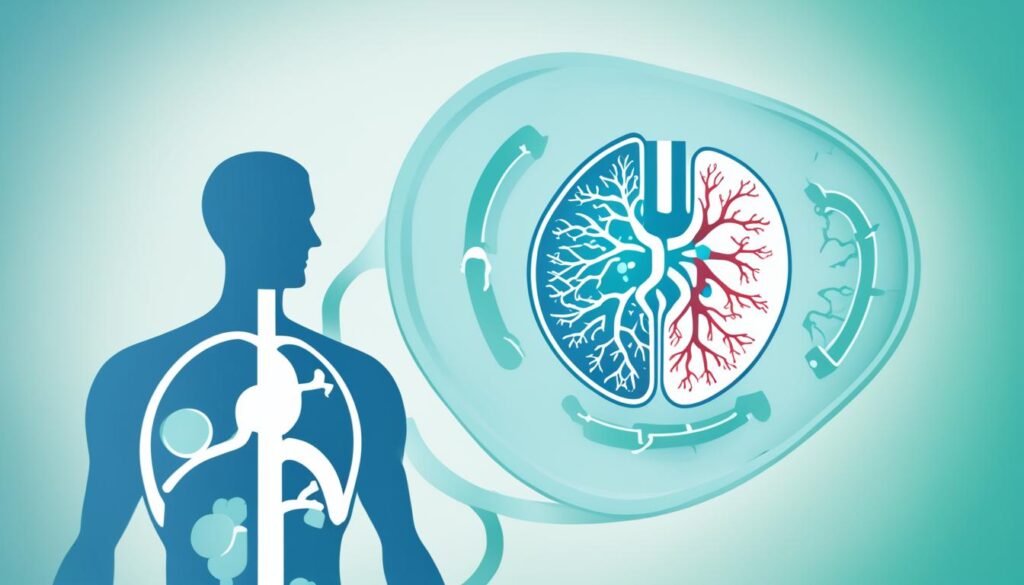
The image above illustrates the significance of Medicare eligibility for individuals with ESRD, highlighting the coverage and support available through the Medicare program.
Understanding the Medicare eligibility for ESRD is crucial for individuals living with this condition. By applying for Medicare and meeting the specific criteria for ESRD, individuals can access the necessary medical care and treatments to support their overall health and well-being.
Medicare Eligibility for Amyotrophic Lateral Sclerosis (ALS)
If you have been diagnosed with Amyotrophic Lateral Sclerosis (ALS), commonly known as Lou Gehrig’s disease, you are eligible for Medicare regardless of your age. Medicare eligibility for ALS is automatic, meaning you don’t need to go through a separate application process. Medicare can provide essential coverage and support to help manage your healthcare needs as you navigate life with ALS.
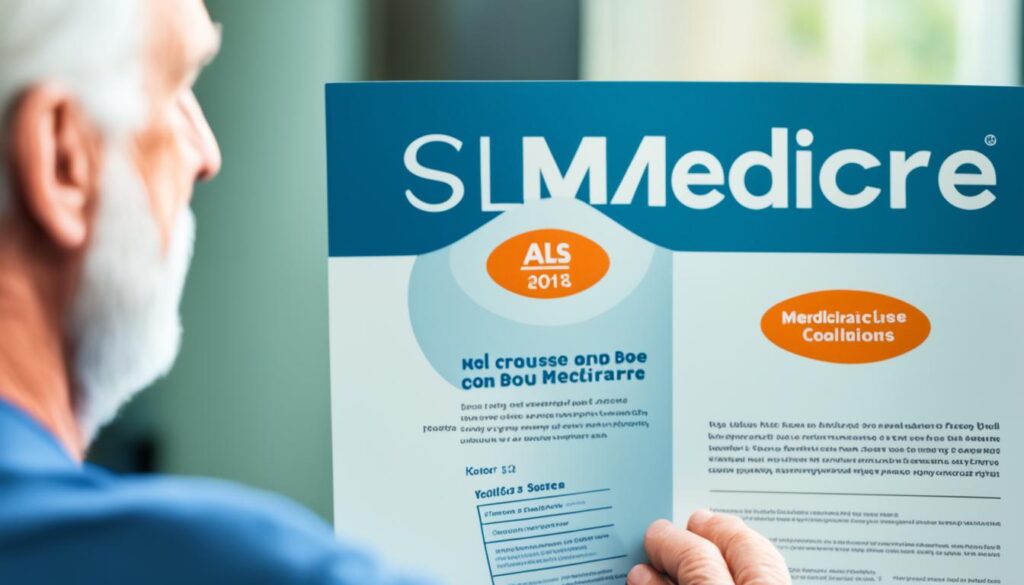
Living with ALS presents unique challenges, and having access to Medicare can greatly assist in ensuring you receive the necessary medical care and support. With Medicare, you can have peace of mind knowing that important healthcare services and treatments are covered.
Medicare can provide coverage for various ALS-related expenses, including:
- Doctor visits and consultations
- Hospital stays and inpatient care
- Home health services
- Medical equipment and supplies
- Prescription medications
By having Medicare coverage, you can gain access to a wide range of healthcare services and treatments that are crucial for managing the symptoms and complications of ALS.
It is important for individuals with ALS to explore their Medicare coverage options and understand the benefits available to them. Medicare can offer financial protection and peace of mind, allowing you to focus on managing your condition and improving your quality of life. If you have ALS, take advantage of your automatic Medicare eligibility and ensure you are making the most of the benefits that Medicare provides.
Understanding Medicare Parts A and B
When it comes to Medicare, it’s important to understand the different parts and what they cover. Medicare has two main parts: Part A and Part B. Let’s take a closer look at each:
Medicare Part A:
Medicare Part A covers inpatient hospital stays, skilled nursing facility care, hospice care, and some home health care services. For most people, there is no monthly premium for Part A if they or their spouse paid Medicare taxes while working. Remember, Part A helps cover the cost of care when you’re admitted to a healthcare facility.
Medicare Part B:
Medicare Part B is responsible for covering doctor visits, outpatient care, medical supplies, and preventive services like flu shots and cancer screenings. Unlike Part A, everyone pays a monthly premium for Part B. It’s crucial to keep up with your Part B premiums to ensure continued coverage for necessary medical services.
Understanding the eligibility requirements for each part of Medicare is essential. Make sure you meet the necessary Medicare eligibility requirements for both Medicare Part A and Part B to access the coverage they provide.

Table 6: Medicare Parts A and B Coverage
| Medicare Part | Coverage |
|---|---|
| Part A | Inpatient hospital stays Skilled nursing facility care Hospice care Some home health care services |
| Part B | Doctor visits Outpatient care Medical supplies Preventive services |
With a clear understanding of Medicare Parts A and B, you’ll be better equipped to navigate the healthcare system and make informed decisions about your coverage.
Exploring Medicare Advantage Plans (Part C)
Medicare Part C, also known as Medicare Advantage, offers a valuable alternative to Original Medicare (Part A and Part B). These plans are provided by private companies approved by Medicare. Medicare Advantage plans are required to offer the same coverage as Original Medicare, but they may also include additional benefits such as vision, dental, and prescription drug coverage. Choosing Medicare Advantage allows you to have comprehensive healthcare coverage under a single plan.
When considering Medicare Advantage, it’s essential to understand the Medicare enrollment criteria for Part C. The eligibility requirements may vary depending on the specific plan. Some Medicare Advantage plans may require individuals to meet certain age or health conditions, while others may have no specific eligibility restrictions. Before enrolling, it’s important to explore the options available and consider your individual healthcare needs.

By opting for Medicare Advantage, you gain the ability to access a wide range of healthcare services and benefits that align with your specific needs and preferences. These plans offer flexibility, convenience, and often include additional coverage not provided by Original Medicare. However, it’s crucial to carefully review the details and limitations of each Medicare Advantage plan before making a decision.
Understanding Medicare Prescription Drug Coverage (Part D)
Medicare Part D provides essential prescription drug coverage for individuals enrolled in Medicare. This coverage is offered through private companies approved by Medicare, ensuring that beneficiaries have access to necessary medications. Understanding the details of Medicare Part D is crucial for individuals seeking affordable and comprehensive prescription drug coverage.

Medicare eligibility for Part D requires individuals to be enrolled in either Medicare Part A or Part B. Once enrolled in Medicare, individuals can then choose to enroll in a Medicare Part D plan to supplement their healthcare coverage.
Eligibility for Medicare Part D may vary depending on the specific plan chosen. While there are general qualifications for enrollment, such as being enrolled in Part A or Part B, it is important to review the specific requirements of each plan to ensure eligibility.
Formulary and Cost-sharing Requirements
Medicare Part D plans have what is called a “formulary,” which is a list of covered prescription drugs. The formulary determines which medications are covered by the plan and at what cost. It is essential to review the formulary of a specific plan to determine if it covers the necessary medications.
Additionally, Medicare Part D plans may have different cost-sharing requirements, including monthly premiums, deductibles, copayments, and coinsurance. These costs can vary depending on the plan and the specific medications needed. It is crucial to carefully consider the cost-sharing requirements when choosing a Medicare Part D plan.
| Cost-sharing Element | Description |
|---|---|
| Monthly Premium | The amount paid each month to maintain Medicare Part D coverage. |
| Deductible | The initial amount that needs to be paid out-of-pocket before the plan begins covering the cost of prescription drugs. |
| Copayment | A fixed amount paid for each prescription, often dependent on the tier of the medication. |
| Coinsurance | A percentage of the cost of a prescription drug that the beneficiary must pay. |
By understanding the details of Medicare Part D coverage, including the formulary and cost-sharing requirements, individuals can make informed decisions about their prescription drug coverage and find a plan that best meets their needs and budget.
Special Considerations for Medicare Eligibility
In addition to the general eligibility criteria for Medicare, there are several special considerations and factors that can impact your eligibility. It’s important to understand these considerations to determine whether you qualify for Medicare benefits.
Employer-Sponsored Coverage
One consideration is whether you have employer-sponsored health insurance coverage. If you or your spouse are currently employed and have health insurance through your job, you may need to consider how this coverage relates to Medicare eligibility. It’s crucial to review the terms of your employer-sponsored coverage and consult with your employer or a Medicare representative to understand how it may affect your Medicare eligibility.
Creditable Coverage
Creditable coverage refers to health insurance coverage that is considered at least as good as Medicare’s standard coverage. If you have creditable coverage through a private insurance plan, such as from a current or former employer, you may be able to delay enrolling in certain parts of Medicare without facing future penalties. Make sure to review your current coverage and determine whether it meets Medicare’s standards for creditable coverage.
Enrollment Periods
Understanding the different enrollment periods for Medicare is essential for determining when you can apply for coverage. These enrollment periods include the Initial Enrollment Period (IEP), General Enrollment Period (GEP), and Special Enrollment Period (SEP). Each period has its own set of requirements and deadlines, so it’s important to familiarize yourself with them to ensure timely enrollment in Medicare. Review the Medicare enrollment periods and ensure you apply within the appropriate timeframe to avoid any gaps in coverage.
Health Status and Specific Medical Conditions
In certain cases, individuals with specific medical conditions may be eligible for Medicare benefits even if they do not meet the typical age or disability requirements. Conditions such as Lou Gehrig’s disease (ALS) and End-Stage Renal Disease (ESRD) may qualify individuals for Medicare benefits. If you have a specific medical condition, consult with your healthcare provider or a Medicare representative to determine your eligibility for Medicare benefits.
| Special Considerations | Eligibility Factors |
|---|---|
| Employer-Sponsored Coverage | Review employer-sponsored health insurance coverage |
| Creditable Coverage | Determine if your existing coverage is creditable |
| Enrollment Periods | Understand the different Medicare enrollment periods |
| Health Status and Specific Medical Conditions | Explore eligibility based on specific medical conditions |
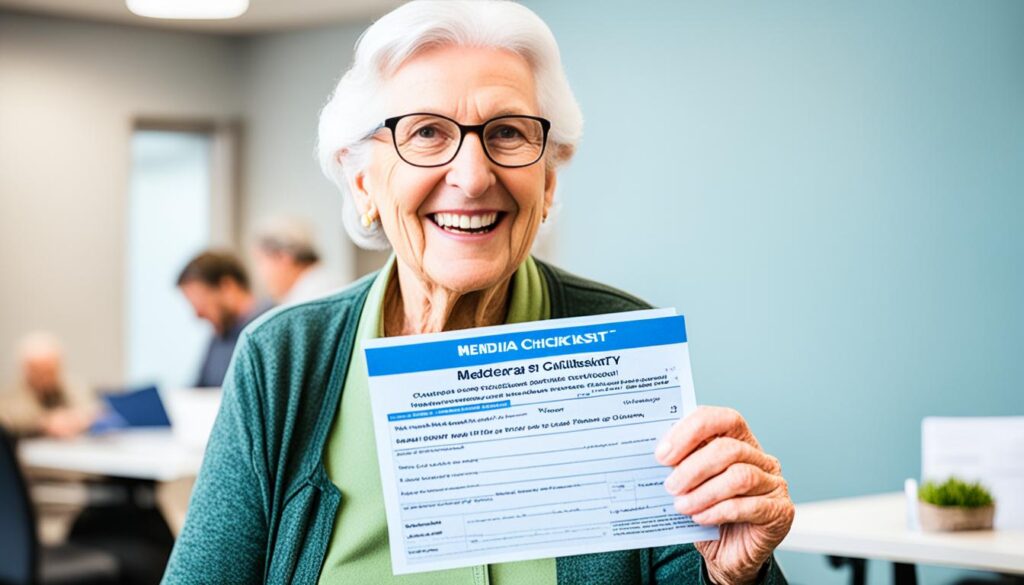
By considering these special factors and seeking guidance from the Social Security Administration, you can determine your eligibility for Medicare benefits and ensure you have the appropriate coverage for your healthcare needs.
Conclusion
Understanding the eligibility criteria and qualifications for Medicare is crucial in navigating the healthcare system. Medicare provides essential coverage for individuals 65 and older, those with disabilities, End-Stage Renal Disease (ESRD), and Amyotrophic Lateral Sclerosis (ALS). By thoroughly reviewing the eligibility requirements for each part of Medicare and considering individual healthcare needs, individuals can make informed decisions regarding enrollment and coverage options.
Medicare eligibility ensures that those who meet the criteria can access the benefits and support provided by this vital healthcare program. Whether you are approaching the age of 65, have a disability, or are living with ESRD or ALS, understanding Medicare’s eligibility requirements is key to accessing the appropriate coverage for your healthcare needs.
In conclusion, Medicare eligibility offers a range of healthcare options for eligible individuals. When you understand the eligibility criteria for Medicare and the qualifications for each part, you can make informed decisions about your healthcare coverage. Whether you qualify based on age, disability, ESRD, or ALS, Medicare provides essential support for accessing necessary healthcare services. By exploring your eligibility and understanding Medicare’s coverage options, you can ensure that you receive the benefits and assistance you need.
FAQ
Who is eligible for Medicare at age 65?
Individuals who are 65 years or older are generally eligible for Medicare. This includes individuals who are receiving or are eligible to receive Social Security or Railroad Retirement Board benefits.
How do individuals with disabilities qualify for Medicare?
Individuals with disabilities can qualify for Medicare if they have been receiving Social Security Disability Insurance (SSDI) benefits for at least two years. Medicare eligibility for individuals with disabilities is determined by the Social Security Administration based on their definition of disability.
What are the eligibility requirements for Medicare coverage for End-Stage Renal Disease (ESRD)?
Individuals with End-Stage Renal Disease (ESRD) may be eligible for Medicare regardless of their age. ESRD is a permanent kidney failure requiring dialysis or a transplant. Medicare eligibility for ESRD requires individuals to apply for Medicare coverage through the Social Security Administration.
Can individuals with Amyotrophic Lateral Sclerosis (ALS) qualify for Medicare?
Yes, individuals with Amyotrophic Lateral Sclerosis (ALS), also known as Lou Gehrig’s disease, are eligible for Medicare regardless of their age. Medicare eligibility for ALS is automatic, and no specific application is required.
What do Medicare Part A and Part B cover?
Medicare Part A covers inpatient hospital stays, skilled nursing facility care, hospice care, and some home health care. Most people do not pay a premium for Part A if they or their spouse paid Medicare taxes while working. Medicare Part B covers doctor visits, outpatient care, medical supplies, and preventive services. Everyone pays a monthly premium for Part B.
What are Medicare Advantage plans (Part C) and who is eligible?
Medicare Advantage plans, also known as Part C, offer an alternative to Original Medicare (Part A and Part B). These plans are offered by private companies approved by Medicare. Medicare enrollment criteria for Part C may vary depending on the plan.
What is Medicare Part D and who is eligible for prescription drug coverage?
Medicare Part D provides prescription drug coverage for Medicare beneficiaries. Part D plans are offered by private companies approved by Medicare. Medicare eligibility for Part D requires individuals to be enrolled in Medicare Part A or Part B. Medicare enrollment qualifications for Part D may vary depending on the specific plan.
Are there any special considerations for Medicare eligibility?
Yes, there are various special considerations and factors that can affect Medicare eligibility, including employer-sponsored coverage, creditable coverage, enrollment periods, health status, and specific medical conditions. It is important to carefully evaluate individual circumstances and seek guidance from the Social Security Administration to determine eligibility for Medicare benefits.
What should I know about determining Medicare eligibility?
Understanding the eligibility criteria and qualifications for Medicare is crucial in navigating the healthcare system. Medicare provides essential coverage for individuals 65 and older, those with disabilities, End-Stage Renal Disease, and Amyotrophic Lateral Sclerosis. It is important to thoroughly review the eligibility requirements for each part of Medicare and consider individual healthcare needs when making decisions regarding enrollment and coverage options.
Legal
Medicaid Eligibility Requirements: Find Out Who Qualifies
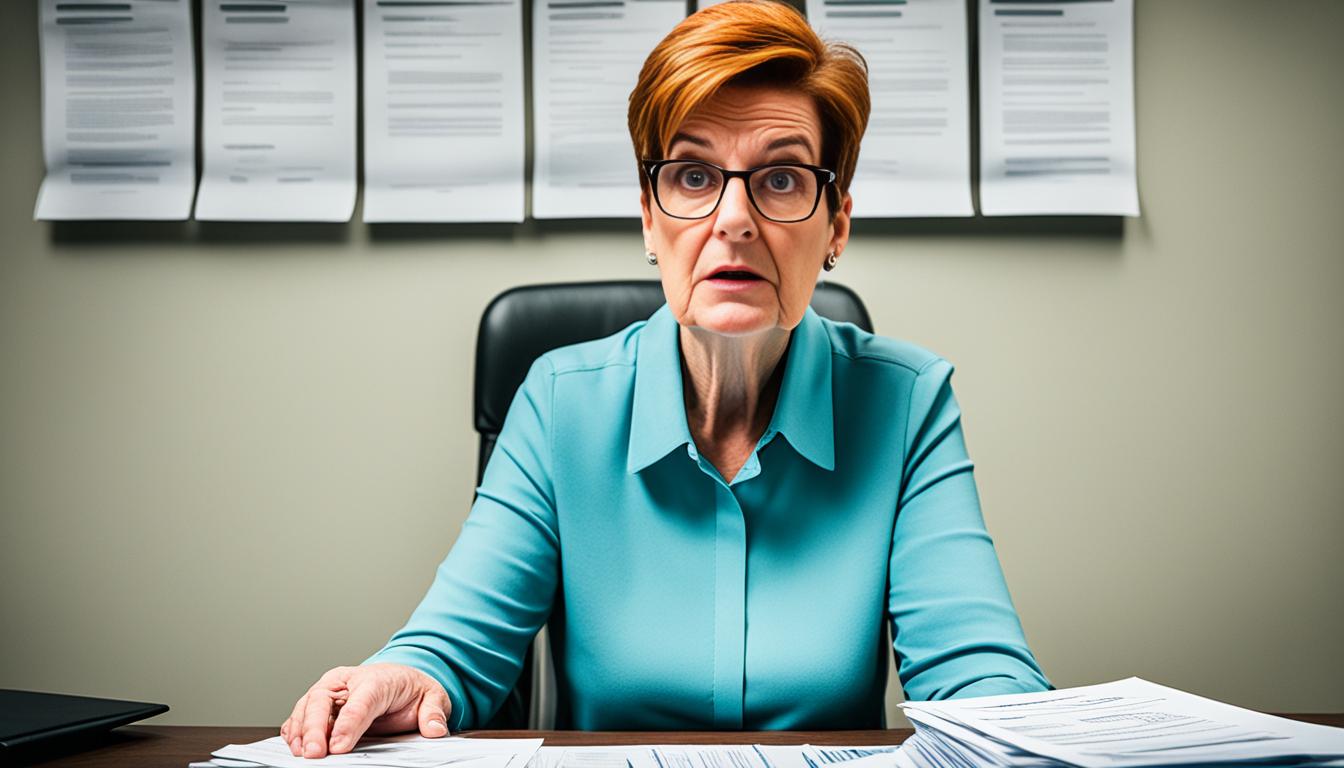
Did you know that Medicaid is the largest health insurance provider in the United States, providing medical assistance to millions of Americans? If you come from a low-income household, are pregnant, elderly, or a person with a disability, Medicaid might be your ticket to accessing the healthcare benefits you deserve.
Understanding the eligibility criteria for Medicaid is crucial for those who require affordable healthcare options. From income requirements to asset limits and coverage qualifications, we’ll delve into the details to help you determine if you or your loved ones are eligible for this vital program.
Key Takeaways:
- Medicaid is the largest source of health coverage in the United States.
- Eligibility criteria for Medicaid include income requirements and asset limits.
- Certain groups, such as low-income families, pregnant women, and individuals with disabilities, are mandated to be covered by Medicaid.
- The Medicaid expansion under the Affordable Care Act extended eligibility to many low-income adults.
- Medicaid eligibility also involves meeting non-financial criteria like residency, citizenship, age, or pregnancy.
Mandatory Eligibility Groups
Medicaid is required to cover certain groups of individuals in order to ensure access to healthcare for those who need it the most.
One of the mandatory eligibility groups for Medicaid coverage includes low-income families. These are families who fall within a specific income range set by the state. Medicaid provides vital healthcare support to these families, ensuring that they receive the necessary medical care they need.
Pregnant women are another group that falls under mandatory eligibility for Medicaid. It is crucial to provide healthcare coverage to pregnant women to promote healthy pregnancies and safe deliveries. Medicaid covers prenatal care, labor and delivery, and postpartum care for pregnant women, ensuring the well-being of both the mother and the baby.
Children are also included in the mandatory eligibility groups for Medicaid. Children may not have access to private health insurance, and Medicaid helps bridge this gap by providing them with comprehensive healthcare coverage. This includes preventive services, such as vaccinations and regular check-ups, as well as treatment for any illnesses or conditions they may have.
Individuals receiving Supplemental Security Income (SSI) are another mandatory eligibility group for Medicaid. SSI is a federal income supplement program that provides support to individuals with disabilities, including blindness, disability, or age 65 and older. Medicaid ensures that these individuals have access to the healthcare services they need to manage their conditions and maintain their overall well-being.
“Medicaid is required to cover certain groups of individuals, such as low-income families, qualified pregnant women, children, and individuals receiving Supplemental Security Income (SSI).”
States may also choose to cover other groups not mandated by federal law. These include individuals receiving home and community-based services and children in foster care who are not otherwise eligible for Medicaid. By expanding coverage to these populations, states can further improve access to healthcare and support for vulnerable individuals.
As we strive to ensure that healthcare is accessible to those who need it most, Medicaid’s coverage extends to mandatory eligibility groups, including low-income families, pregnant women, children, and individuals receiving Supplemental Security Income (SSI). By providing healthcare benefits to these populations, Medicaid plays a vital role in promoting the well-being and health of individuals and communities.
Medicaid Expansion
The Affordable Care Act of 2010 allowed states to expand Medicaid coverage to nearly all low-income Americans under age 65. This expansion extended eligibility for children to at least 133% of the federal poverty level (FPL) in every state and gave the option to extend eligibility to adults with income at or below 133% of the FPL. Most states have chosen to expand coverage to adults.
This expansion of Medicaid eligibility has significantly increased access to healthcare for low-income adults. Previously, many low-income adults fell into a coverage gap, where they did not qualify for Medicaid but also did not have access to affordable health insurance through other means.
“Medicaid expansion has been vital in providing essential healthcare services to low-income adults who were previously uninsured,” says Dr. Sarah Thompson, a healthcare policy expert. “By expanding Medicaid, states have been able to extend coverage to a vulnerable population that often faces barriers to accessing healthcare services.”
Since the implementation of Medicaid expansion, millions of previously uninsured low-income adults have gained access to comprehensive healthcare coverage. This expansion has not only improved individuals’ health outcomes but has also reduced the financial burden on both individuals and healthcare providers.
Impact of Medicaid Expansion on Health Outcomes
Studies have consistently shown that Medicaid expansion has led to better health outcomes among low-income adults. Access to affordable healthcare services has allowed individuals to receive preventative care, manage chronic conditions, and seek timely treatment for acute illnesses and injuries.
Research conducted by the Journal of the American Medical Association found that states that expanded Medicaid experienced significant improvements in various health indicators, including reduced rates of delayed medical care, improved self-rated health status, increased rates of regular check-ups, and lower rates of avoidable hospitalizations.

Financial Benefits of Medicaid Expansion
Medicaid expansion has also had positive financial implications for both individuals and healthcare providers. With Medicaid coverage, low-income adults no longer have to rely on costly emergency room visits for non-emergency medical needs. Instead, they can access primary care providers, preventive services, and specialty care in a timely manner, leading to cost savings and improved health outcomes.
For healthcare providers, Medicaid expansion has reduced the burden of uncompensated care. By providing coverage to previously uninsured patients, healthcare providers have seen a decrease in uncompensated care costs, ultimately improving their financial stability and allowing them to better serve their communities.
State-to-State Variations in Medicaid Expansion
Although most states have chosen to expand Medicaid, there are variations in the specific parameters of the expansion across different states. Some states have implemented alternative expansion models, such as the use of private insurance plans to provide coverage for newly eligible individuals. These variations can impact eligibility criteria, enrollment processes, and program administration.
To better understand the specifics of Medicaid expansion in your state, refer to the following table:
| State | Expansion Status | Income Eligibility Threshold for Adults |
|---|---|---|
| Texas | No Expansion | N/A |
| California | Expanded | Up to 138% FPL |
| Florida | No Expansion | N/A |
| New York | Expanded | Up to 138% FPL |
| Ohio | Expanded | Up to 138% FPL |
For more information on Medicaid expansion in your state, visit your state’s Medicaid agency website or consult with a local healthcare navigator or enrollment counselor.
Determining Financial Eligibility
In order to determine eligibility for Medicaid, financial factors play a crucial role. The Affordable Care Act introduced a new approach known as Modified Adjusted Gross Income (MAGI) to assess income eligibility. MAGI takes into account taxable income and tax filing relationships, and it does not consider income disregards or asset tests.
Under MAGI, certain individuals may be exempt from income counting rules. For instance, individuals with blindness, disability, or those aged 65 and older may have different guidelines for determining their financial eligibility for Medicaid.
| MAGI-based Income Counting Rules | Exemptions |
|---|---|
| MAGI considers taxable income and tax filing relationships. | Individuals with blindness, disability, or age 65 and older. |
| Income disregards or asset tests are not allowed. |
The new income counting methodology ensures a streamlined process for determining financial eligibility for Medicaid, providing a more accurate assessment of an individual’s income status.
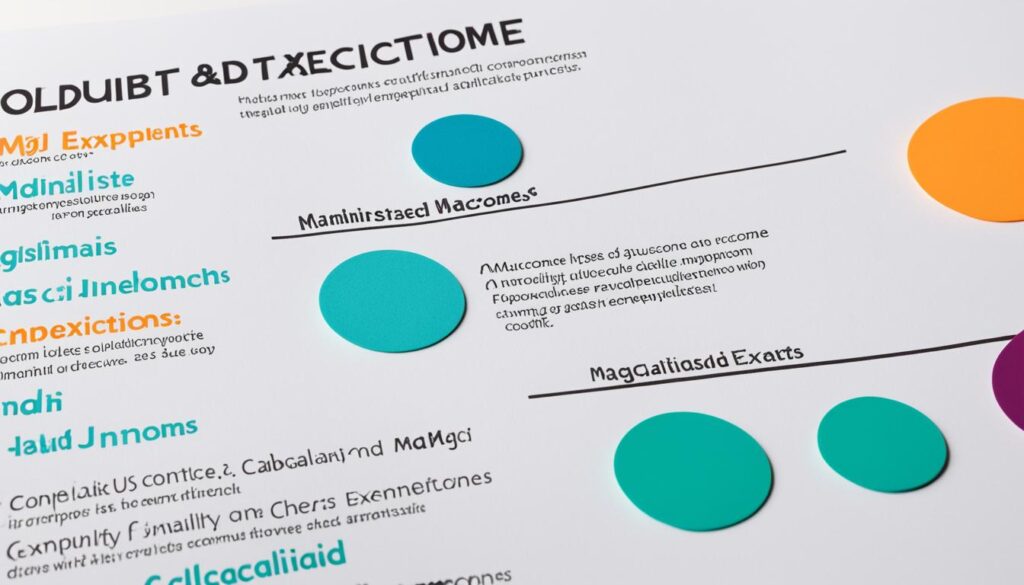
Examples of MAGI Eligibility Determination
Let’s take a look at a few examples to understand how Modified Adjusted Gross Income (MAGI) affects financial eligibility for Medicaid:
- Example 1: John, a 40-year-old individual with no disabilities, has a taxable income of $30,000 per year and no dependents. He does not qualify for any exemptions and is subject to MAGI-based income counting rules for Medicaid eligibility.
- Example 2: Sarah, a 68-year-old individual with blindness, has a taxable income of $25,000 per year and no dependents. She qualifies for the exemption based on her disability and is exempt from MAGI-based income counting rules.
- Example 3: Mark, a 55-year-old individual with a taxable income of $20,000 per year and two dependent children, qualifies for the exemption based on his age. He is exempt from MAGI-based income counting rules.
These examples demonstrate the impact of Modified Adjusted Gross Income (MAGI) and exemptions on the determination of financial eligibility for Medicaid. It is important for individuals to be aware of the specific rules that apply to their circumstances when applying for Medicaid.
Non-Financial Eligibility Criteria
In addition to meeting financial eligibility criteria, Medicaid beneficiaries must also meet certain non-financial eligibility criteria. These criteria ensure that individuals who are eligible for Medicaid have the necessary qualifications to receive the benefits.
One of the non-financial eligibility criteria is residency. Medicaid typically requires individuals to be residents of the state in which they are applying for coverage. Proof of residency, such as a driver’s license or utility bill, may be required during the application process.
Citizenship is another important eligibility criterion. To qualify for Medicaid, individuals must be U.S. citizens or qualified non-citizens. Qualified non-citizens include lawful permanent residents, refugees, asylees, and individuals with certain humanitarian statuses.
Age is also a factor that can affect Medicaid eligibility. The program provides coverage to specific age groups, including children, adults, and seniors. Each age group may have different eligibility requirements based on factors such as income and family size.
Additionally, pregnancy is a non-financial eligibility criterion for Medicaid. Pregnant women may qualify for Medicaid coverage to ensure access to prenatal care and other necessary healthcare services.
Meeting these non-financial eligibility criteria is crucial for individuals seeking Medicaid benefits. Residency, citizenship, age, and pregnancy requirements help ensure that the program serves those who are most in need and eligible for the support it provides.
Effective Date and Coverage Period
Once an individual is determined eligible for Medicaid, coverage is typically effective either on the date of application or the first day of the month of application. Retroactive coverage for up to three months prior to the month of application may be available if the individual would have been eligible during that period. Coverage generally stops when the individual no longer meets the eligibility requirements.
Retroactive Coverage
Medicaid provides retroactive coverage for eligible individuals, allowing them to receive reimbursement for healthcare expenses incurred prior to the application date. Retroactive coverage helps ensure that low-income individuals receive the healthcare they need, even if they were not aware of their eligibility at the time of service.
Retroactive coverage is particularly beneficial for individuals who may have delayed seeking medical care due to financial constraints. With retroactive coverage, they can receive reimbursement for eligible medical expenses incurred during the retroactive coverage period.
It’s important to note that retroactive coverage is not automatic and must be requested. Individuals should contact their Medicaid agency or the designated healthcare marketplace to inquire about retroactive coverage and initiate the necessary application process.
Effective Date of Coverage
The effective date of coverage determines when an individual’s Medicaid benefits start. The timing varies depending on the specific circumstances and the state’s policies. Here are the two common effective dates:
- Date of Application: If an individual’s application for Medicaid is approved, the coverage can be effective from the date of application. This is beneficial for individuals who require immediate healthcare services and cannot afford to wait for their coverage to start.
- First Day of the Month of Application: In some cases, Medicaid coverage may begin on the first day of the month in which the individual submitted the application. This approach ensures uniformity in coverage start dates and simplifies administrative processes for the Medicaid program.
By providing timely coverage, Medicaid ensures that eligible individuals have access to necessary medical care and can receive the treatment they need without delay.
Cessation of Coverage
Medicaid coverage continues as long as the individual meets the eligibility requirements. However, coverage may cease if the individual’s circumstances change and they no longer meet the eligibility criteria. Factors such as changes in income, assets, household composition, or immigration status can impact eligibility.
It is crucial for individuals to notify their Medicaid agency of any changes in their eligibility status to ensure the timely adjustment or continuation of coverage. Failure to report changes in a timely manner may result in the termination of Medicaid benefits.
Individuals should also be aware of any recertification or renewal requirements to maintain their Medicaid coverage. Medicaid agencies typically conduct periodic eligibility reviews to confirm ongoing eligibility.
| Effective Date | Coverage Period |
|---|---|
| Date of Application | From the date of application |
| First Day of the Month of Application | From the first day of the month of application |
It is important for individuals to understand the effective date and coverage period to ensure they receive timely and uninterrupted Medicaid benefits. By being aware of these details, individuals can plan their healthcare needs and make informed decisions regarding their healthcare.
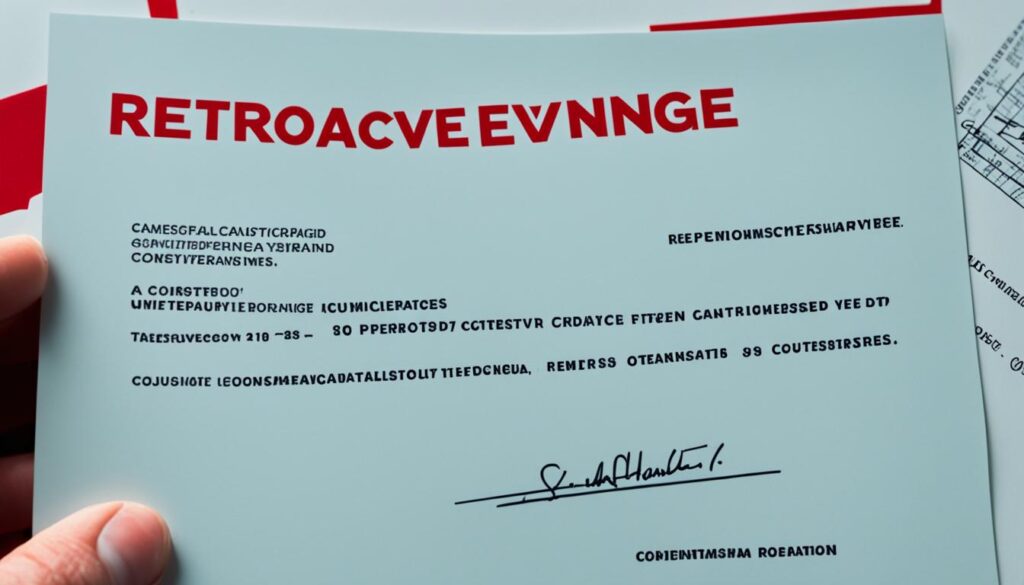
Medically Needy Program
In some states, there is a special program called the Medically Needy Program. This program provides an opportunity for individuals with significant health needs and income above the regular eligibility limits to become eligible for Medicaid. The Medically Needy Program allows these individuals to “spend down” their income on medical and remedial care.
Here’s how the spend down process works:
- The individual starts with their income, which is above the regular Medicaid eligibility limits.
- They subtract the state’s medically needy income level from their income.
- The difference between their income and the medically needy income level is known as the spend down amount.
- To be eligible for Medicaid, the individual must have incurred medical expenses that exceed their spend down amount.
- Once their incurred expenses exceed the spend down amount, they can be eligible for Medicaid.
The Medically Needy Program provides support to individuals who have higher incomes but still require significant medical care and assistance. It ensures that individuals with medically necessary expenses can access the healthcare they need, even if their income exceeds the regular eligibility limits.
This program is particularly beneficial for individuals with chronic conditions, disabilities, or other medical needs that require ongoing care and treatment. It helps bridge the gap between their income and the cost of their healthcare expenses.
Here’s a visual representation of how the Medically Needy Program works:
| Income | Medically Needy Income Level | Spend Down Amount | Incurred Expenses | Medicaid Eligibility |
|---|---|---|---|---|
| $2,500 | $1,500 | $1,000 | $1,500 | Eligible |
As shown in the table above, an individual with an income of $2,500 has a medically needy income level of $1,500. This means they have a spend down amount of $1,000. If their incurred medical expenses reach $1,500 or more, they become eligible for Medicaid.

The Medically Needy Program provides a lifeline to individuals who would otherwise be ineligible for Medicaid due to their higher income. It ensures that those with significant medical needs can access the vital healthcare services and support they require.
Appeals and Fair Hearings
Medicaid applicants have the right to request a fair hearing if they believe that the state agency made an erroneous denial or if the state has not acted promptly. The appeals process may be conducted by the Medicaid agency, the Exchange, or another state agency. Approval from CMS may be required for delegation of appeals to another state agency.
| Appeals Process | Responsibility |
|---|---|
| The Medicaid agency | Conducts the appeals process for most cases |
| The Exchange Appeals Entity | Handles appeals related to eligibility determinations made through the Health Insurance Marketplace |
| Another state agency | May be designated to conduct the appeals process |
| CMS approval may be required | For delegation of appeals to another state agency |
If an applicant disagrees with the initial decision made by the Medicaid agency or the Exchange Appeals Entity, they can request a fair hearing. This process allows the applicant to present their case and provide any additional evidence to support their eligibility for Medicaid.
“The fair hearing provides an opportunity for applicants to ensure their voice is heard and to address any concerns or issues that may have contributed to the denial.”
Key Steps in the Appeals Process:
- Submit an appeal request to the appropriate agency within the specified timeframe.
- Provide supporting documentation and any additional evidence to support the appeal.
- Prepare for the fair hearing, including gathering relevant documents and preparing a statement.
- Participate in the fair hearing, presenting the case and addressing any questions or concerns raised.
- Await the decision from the appeals entity.
It’s important for applicants to understand their rights and options when it comes to appealing a denial of Medicaid eligibility. By engaging in the appeals process and presenting their case, individuals have the opportunity to receive a fair hearing and potentially have their eligibility determination overturned.

Application Process
Applying for Medicaid is a simple and straightforward process that can be done directly with your state or through the Health Insurance Marketplace. Whether you choose to apply online, by mail, or in person, there are resources available to guide you through each step of the application.
If you decide to apply directly with your state, you can visit their official website or contact the Medicaid agency to obtain the necessary application forms. Completing the application may require you to provide personal information, such as your name, address, Social Security number, and income details.
On the other hand, if you prefer to apply through the Health Insurance Marketplace, you can access the application form via the HealthCare.gov website or by calling the Marketplace Call Center. The Marketplace application will also assess your eligibility for other health coverage options, such as private insurance plans.
Regardless of the application method you choose, it’s important to provide accurate and up-to-date information to ensure an accurate determination of your eligibility for Medicaid. Remember to read and follow the instructions carefully, and don’t hesitate to seek assistance if you have any questions or need support.
Our goal is to make the application process as accessible and user-friendly as possible. We understand that navigating healthcare benefits can be overwhelming, and we’re here to help every step of the way.
Once your application is submitted, it will be reviewed by the appropriate authorities to determine your eligibility for Medicaid. If your application indicates potential eligibility, it will be forwarded to your state for a final eligibility decision. This decision usually takes into account factors such as income, household size, and other relevant criteria.
During the eligibility determination process, it’s essential to keep track of any communication or requests for additional information from your state or the Health Insurance Marketplace. Responding promptly and providing the requested documentation will help expedite the decision-making process.
Benefits of Applying through the Health Insurance Marketplace
While applying for Medicaid directly with your state is a viable option, there are several benefits to applying through the Health Insurance Marketplace:
- Convenience: The HealthCare.gov website and the Marketplace Call Center offer a user-friendly and convenient platform to apply for Medicaid along with other health coverage options.
- One-Stop Shop: By applying through the Marketplace, you can explore all available health coverage options, including Medicaid, qualified health plans, and other programs that may be suitable for your needs.
- Assistance and Support: The Marketplace provides assistance throughout the application process, including personal help from trained navigators or certified application counselors.
- Income Determination: The Marketplace application utilizes the same income counting rules for Medicaid eligibility as your state, ensuring consistency and accuracy in the determination process.
When applying through the Health Insurance Marketplace, it’s important to remember that if you are determined eligible for Medicaid, your application will be forwarded to your state for the final eligibility decision.
Applying for Medicaid opens up opportunities for affordable and comprehensive healthcare coverage. Whether you choose to apply directly with your state or through the Health Insurance Marketplace, rest assured that there are resources and support available to guide you through the process.

| Step | Description |
|---|---|
| 1 | Determine the application method that suits your needs, whether it’s applying directly with your state or through the Health Insurance Marketplace. |
| 2 | Gather the necessary documents and information, such as identification, income details, and proof of residency. |
| 3 | Complete the application form accurately and thoroughly, following the provided instructions. |
| 4 | Submit your application through your chosen method, either online, by mail, or in person. |
| 5 | Monitor your application status and respond promptly to any requests for additional information. |
| 6 | Await the eligibility decision, which will be made by your state based on the information provided during the application process. |
| 7 | If determined eligible for Medicaid, you will receive confirmation and further instructions on accessing your benefits. |
Eligibility Guide for Specific Groups
When it comes to Medicaid eligibility, different groups of individuals have varying criteria to meet. Let’s explore the eligibility requirements for specific groups, including pregnant individuals, children, adults, aged, blind, and disabled individuals. These criteria are often based on factors like income and family size.
Pregnant Individuals
Pregnant individuals are typically eligible for Medicaid during their pregnancy and up to a certain period postpartum. The specific income limits and coverage periods may vary by state. It’s important for expectant mothers to apply for Medicaid to determine their eligibility and ensure access to essential prenatal care.
Children
Medicaid provides comprehensive healthcare coverage for children from low-income families. Income limits for children’s Medicaid may be determined using Modified Adjusted Gross Income (MAGI) rules, which consider taxable income and tax filing relationships. Each state sets its own income limits for children’s Medicaid, ensuring that vulnerable children have access to vital healthcare services.
Adults
Medicaid eligibility requirements for adults may differ depending on the state and whether they fall within the Medicaid expansion population. The Affordable Care Act allowed states to extend Medicaid coverage to low-income adults, with income limits typically set at or below a certain percentage of the federal poverty level (FPL). Adults who qualify for Medicaid can receive essential healthcare services, promoting overall well-being.
The Aged, Blind, and Disabled
Medicaid plays a crucial role in providing healthcare coverage and essential services to the aged, blind, and disabled individuals. Income limits for this group may be higher compared to other eligibility categories. Additionally, asset tests may be applied, which consider an individual’s resources to determine eligibility for certain programs specifically designed for this population. Medicaid ensures that these individuals receive the necessary support to enhance their quality of life.
Income limits and asset tests can vary based on state policies, so it’s important for individuals to check their state’s specific eligibility criteria and apply for Medicaid accordingly.

| Eligibility Group | Income Limits | Asset Test |
|---|---|---|
| Pregnant Individuals | Varies by state | No |
| Children | Varies by state and age | No |
| Adults | Varies by state and Medicaid expansion | No (may depend on program) |
| The Aged, Blind, and Disabled | Varies by state (higher limits) | Yes (may depend on program) |
Home and Community-Based Services
Home and Community-Based Services (HCBS) programs play a crucial role in providing specialized care and support for individuals with specific medical or developmental needs. These programs offer an alternative to institutional care, allowing individuals to receive the necessary services in the comfort of their own homes or in community-based settings. HCBS programs aim to enhance independence, promote community integration, and improve the overall quality of life for program participants.
HCBS programs cover a wide range of services tailored to meet the unique needs of individuals. These services may include:
- Personal care assistance
- Home health care
- Respite care
- Habilitation services
- Assistive technology
- Behavioral supports
- And more
Specialized programs within HCBS may be available for individuals who do not qualify for other Medicaid programs or who require additional supports. These specialized programs are designed to address specific conditions or circumstances and provide targeted services to meet the individual’s unique needs. Examples of specialized programs include:
- Programs for individuals with intellectual or developmental disabilities
- Programs for individuals with traumatic brain injuries
- Programs for individuals with physical disabilities
- Programs for individuals with chronic illnesses
- Programs for individuals with behavioral health needs
These specialized programs aim to provide comprehensive care and support, enabling individuals to live fulfilling and meaningful lives within their communities. By offering a range of services and supports, HCBS programs strive to enhance individuals’ independence, well-being, and overall quality of life.

Benefits of Home and Community-Based Services
There are numerous benefits associated with receiving care through HCBS programs. Some of these benefits include:
“HCBS programs provide individuals with the opportunity to receive personalized care and support services in the least restrictive setting. This allows individuals to maintain their independence, remain connected to their communities, and lead more fulfilling lives.”
- Increased independence: HCBS programs empower individuals by promoting autonomy and independence. By providing services and supports in their own homes or community settings, individuals have more control over their daily lives and decisions.
- Community integration: Being able to receive care and support in the community promotes social connectedness and encourages individuals to actively participate in community activities and events.
- Improved quality of life: HCBS programs aim to improve the overall quality of life for individuals by addressing their unique needs and promoting their health, well-being, and happiness.
- Cost-effectiveness: HCBS programs can often be more cost-effective compared to institutional care or long-term hospital stays, allowing for efficient allocation of resources.
By offering specialized care and support in the least restrictive setting, HCBS programs empower individuals and promote their overall well-being and quality of life.
| Types of Home and Community-Based Services | Description |
|---|---|
| Personal care assistance | Assistance with activities of daily living, such as bathing, dressing, eating, and toileting. |
| Home health care | Skilled nursing care, therapies, and other medical services provided in the individual’s home. |
| Respite care | Temporary relief for caregivers, allowing them to take a break from their caregiving responsibilities. |
| Habilitation services | Services and supports to help individuals with developmental disabilities acquire and maintain skills necessary for daily living. |
| Assistive technology | Devices and equipment that help individuals with disabilities perform tasks and enhance their independence. |
| Behavioral supports | Services and interventions to support individuals with behavioral health needs and promote positive behaviors. |
Conclusion
In conclusion, Medicaid eligibility is determined based on various factors, including income, assets, and categorical criteria. The eligibility requirements may vary among states, so it is important for individuals to apply for coverage to determine their eligibility status. Medicaid plays a vital role in providing essential health coverage to millions of Americans, ensuring access to necessary medical services and supports.
It is important to note that Medicaid is a joint federal and state program, making it the largest source of health coverage in the United States. The program caters to a wide range of individuals, including children, pregnant women, parents, seniors, and individuals with disabilities.
Whether it’s low-income families, pregnant women, children, or individuals receiving Supplemental Security Income, Medicaid has mandatory eligibility groups that must be covered. Some states have also chosen to expand coverage to low-income adults through Medicaid expansion.
To determine eligibility, financial factors such as Modified Adjusted Gross Income (MAGI) are considered, while non-financial criteria like residency, citizenship, age, and pregnancy must also be met. The effective date of coverage is typically the date of application or the first day of the month of application, with the possibility of retroactive coverage in some cases.
Medicaid is available to various groups of individuals, including low-income families, pregnant women, children, and individuals receiving Supplemental Security Income (SSI). Eligibility criteria may vary by state.
Medicaid eligibility criteria include meeting income and asset limits, being a resident of the state, and being a U.S. citizen or qualified non-citizen. Certain groups may have additional requirements based on age or pregnancy.
Income limits for Medicaid vary by state and eligibility group. The Affordable Care Act introduced a new methodology called Modified Adjusted Gross Income (MAGI) to determine income eligibility for Medicaid. Some Medicaid programs have asset limits, which consider the value of an individual’s resources, such as savings accounts or property. However, not all programs have asset limits, and the rules may differ by state.
Individuals can apply for Medicaid directly with their state or through the Health Insurance Marketplace. If deemed potentially eligible for Medicaid, the application will be forwarded to the state for a final decision.
Medicaid applicants have the right to request a fair hearing if they believe their denial was erroneous or if the state has not acted promptly. The appeals process may be conducted by the Medicaid agency or another state agency.
In some cases, Medicaid coverage can be retroactive for up to three months prior to the month of application, if the individual would have been eligible during that period.
The Medicaid expansion, authorized by the Affordable Care Act, allows states to extend Medicaid coverage to low-income adults with income at or below 133% of the federal poverty level. Some states have medically needy programs that allow individuals with high medical expenses and income slightly above regular eligibility limits to become eligible by “spending down” their income on medical and remedial care.
HCBS programs provide medical care and supports for individuals with specific medical or developmental needs. These programs offer alternatives to institutional care, allowing individuals to receive necessary care in the least restrictive setting.
Medicaid coverage is typically effective either on the date of application or the first day of the month of application. Coverage stops when the individual no longer meets the eligibility requirements.
FAQ
Who is eligible for Medicaid?
What are the Medicaid eligibility criteria?
What are the income requirements for Medicaid?
Are there asset limits for Medicaid?
How do I apply for Medicaid?
What happens if my Medicaid application is denied?
Can I receive retroactive Medicaid coverage?
What is the Medicaid expansion?
Are there any alternative Medicaid programs for individuals with significant health needs?
What are Home and Community-Based Services (HCBS) programs?
What is the coverage period for Medicaid?
Legal
What's the Difference Between a Will and a Living Trust?
Fascinated by the distinctions between a will and a living trust? Unravel the complexities and discover which estate planning tool suits your needs best.

Have you ever considered the nuanced distinctions between a will and a living trust?
The distinction between these two estate planning tools is often a point of confusion for many individuals.
By understanding the fundamental differences and unique benefits of each, you can make informed decisions that align with your specific financial and familial circumstances.
Let's explore how these legal instruments can shape the future of your estate and ensure your wishes are carried out seamlessly.
Key Takeaways
- Living trusts allow asset control in life, wills dictate post-death distribution.
- Living trusts avoid probate, wills often go through probate process.
- Integrating will with living trust aids in comprehensive estate planning.
- Living trusts offer privacy, creditor protection, and efficient asset distribution.
Key Distinctions Between Will and Living Trust
When comparing a will to a living trust, the key distinctions become evident in their handling of asset distribution and probate proceedings. A living trust, whether revocable or irrevocable, offers the grantor control over their assets during their lifetime. In contrast, a will dictates asset distribution and executor appointments after the individual's passing.
The transfer of asset ownership during life is a hallmark feature of living trusts, enabling seamless estate management. One significant advantage of a living trust is its ability to bypass probate court proceedings, unlike wills that often undergo probate. This difference can have practical implications in states like Texas, where living trusts provide enhanced probate avoidance benefits due to specific laws and regulations.
Moreover, when dealing with community property, living trusts are favored as they can mitigate legal challenges that may arise when distributing such assets through a will. Thus, the choice between a will and a living trust hinges on factors like control, transfer mechanisms, and probate considerations.
Advantages and Disadvantages of Wills

One of the most notable aspects of wills is their cost-effectiveness in estate planning, typically being free to create. Here are some advantages and disadvantages of wills to consider:
- Cost-Effective: Wills are usually inexpensive to set up, making them accessible for many individuals looking to plan their estates.
- Modifications: Wills can be easily updated or modified to reflect changing circumstances or preferences, ensuring that your wishes are always current.
- Efficient Estate Settlement: Wills help loved ones efficiently settle your estate by clearly outlining how your assets should be distributed.
- Probate Process: However, one disadvantage is that wills must go through the probate process, which can be time-consuming and costly, potentially delaying the distribution of assets.
It's essential to weigh these advantages and disadvantages carefully when deciding if a will is the right choice for your estate planning needs.
Understanding Living Trust Benefits
Moving from the discussion of the advantages and disadvantages of wills, let's now explore the benefits of living trusts in estate planning. Living trusts offer numerous advantages, including the ability to manage and distribute assets during one's lifetime, avoiding the probate process for asset transfer, maintaining privacy as they do not become public record like wills, and providing protection for assets from creditors. Moreover, living trusts can be structured as either revocable or irrevocable, impacting the level of control over assets.
| Benefit | Description | Impact |
|---|---|---|
| Asset Management | Enables management of assets during one's lifetime. | Facilitates organized asset handling. |
| Probate Avoidance | Helps avoid the lengthy and public probate process for asset transfer. | Saves time and maintains privacy. |
| Asset Protection | Offers protection for assets from creditors. | Safeguards assets from potential risks. |
These benefits make living trusts a valuable tool in estate planning, providing individuals with greater control over their assets, enhanced privacy, and efficient asset distribution mechanisms.
Integrating Will and Living Trust
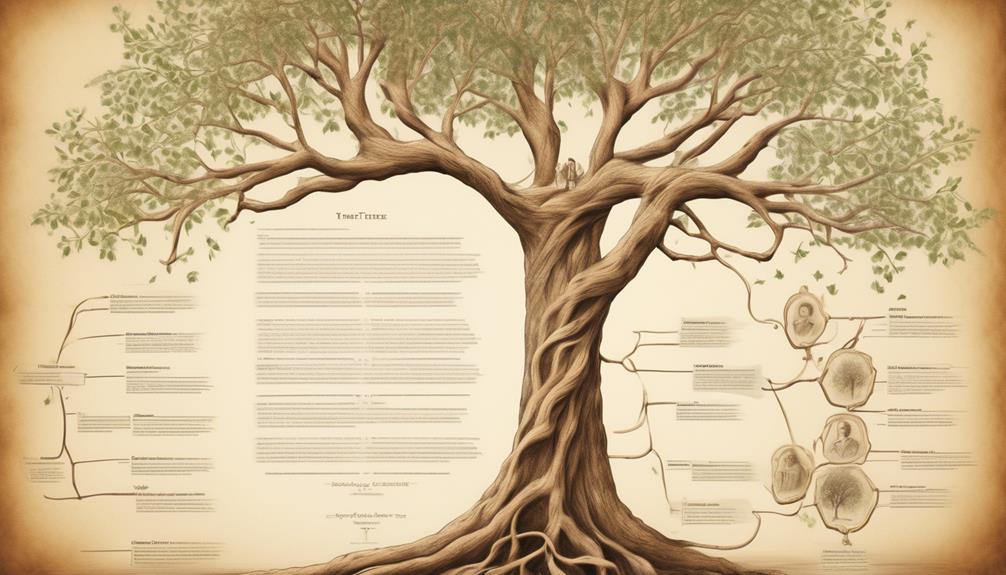
To ensure a comprehensive approach to estate planning, integrating a will with a living trust can be a strategic and efficient way to manage asset distribution. By combining these two estate planning tools, individuals can create a seamless strategy that covers various aspects of asset management and distribution efficiently. Here are key points to consider:
- Pour-Over Will: Acts as a safety net by directing any assets not transferred to the living trust during the grantor's lifetime into the trust upon their death.
- Asset Distribution: Integrating a will with a living trust helps ensure comprehensive asset distribution and management, reducing the likelihood of assets falling outside the trust.
- Probate Avoidance: This integration strategy can help avoid the need for probate for assets held in the living trust, streamlining the distribution process.
- Comprehensive Approach: Overall, combining a will and a living trust provides a comprehensive solution for estate planning, offering a streamlined and efficient way to manage asset distribution.
Making an Informed Estate Planning Choice
When considering estate planning options, it is crucial to make an informed choice between a will and a living trust based on your specific needs and goals. Both wills and living trusts serve different purposes and offer unique benefits. To help you decide which option aligns best with your objectives, we have outlined key factors to consider in the table below:
| Aspect | Living Trust | Will |
|---|---|---|
| Probate Court | Often avoids probate | Requires probate |
| Privacy | Maintains privacy | Becomes public record |
| Asset Protection | Offers protection from | Limited protection from |
| creditors | creditors |
Carefully evaluating these aspects can guide your estate planning decisions towards either avoiding probate, ensuring privacy, seeking asset protection, or simplifying asset management. By understanding the differences between wills and living trusts, you can make a well-informed choice that aligns with your estate planning goals and safeguards your assets and beneficiaries.
Frequently Asked Questions
Why a Living Trust Is Better Than a Will?
When considering why a living trust is better than a will, it's essential to understand the benefits it offers.
A living trust allows assets to bypass probate court, ensuring swift asset distribution. Privacy is maintained as living trusts aren't public records. They also provide flexibility in managing and distributing assets, along with the ability to manage assets in case of incapacity.
These advantages make a living trust a superior choice in estate planning.
What Is the Downside of a Living Trust?
Downsides of a living trust can include the potential complexity and cost of creation compared to wills, lack of tax benefits present in certain irrevocable trusts, inability to designate guardianship for minor children, and the time-consuming process of transferring assets into the trust.
Additionally, assets held in a living trust are viewed as trust property, not individual property. These factors should be considered when deciding between a living trust and a will.
What Assets Cannot Be Placed in a Trust?
Some assets, like IRAs and government benefits, can't be placed into a living trust. Health Savings Accounts and specific insurance policies are generally ineligible. Personal injury settlements and some retirement benefits may not be suitable for trust inclusion. Assets needing ongoing management or with legal restrictions mightn't transfer well.
It's crucial to understand which assets can't be placed in a trust to ensure proper estate planning.
What Is the Basic Difference Between a Will and a Trust?
The basic difference between a will and a trust is like comparing a blueprint to a fully constructed building. Wills dictate asset distribution only after death, while trusts manage assets during our lifetime.
Wills often go through probate court, but trusts can bypass this process. Trusts offer more control and privacy, especially with revocable trusts. Both serve important roles, but trusts provide ongoing management, making them a versatile estate planning tool.
Conclusion
In conclusion, when it comes to estate planning, the choice between a will and a living trust ultimately depends on individual needs and goals.
By understanding the key distinctions and advantages of each option, one can make an informed decision to ensure their assets are distributed according to their wishes.
So, whether you opt for a will or a living trust, it's crucial to take the necessary steps now to secure your legacy for the future.
Albert brings a wealth of knowledge and expertise to our writing team. With a background in caregiving and a deep understanding of the challenges faced by caregivers, Albert’s writing resonates with authenticity and empathy. He is committed to delivering high-quality content that empowers and supports caregivers on their journey.
-

 Dementia Care2 months ago
Dementia Care2 months agoUnderstanding the Stages of Vascular Dementia: A Visual Chart Guide
-

 Dementia Care3 months ago
Dementia Care3 months ago10 Engaging Dementia Games for Cognitive Stimulation
-

 Dementia Care3 months ago
Dementia Care3 months agoHow Gabapentin Affects Dementia: A Comprehensive Guide
-

 Dementia Care3 months ago
Dementia Care3 months ago5 Things You Need to Know About Jack Nicholson’s Dementia
-

 Dementia Care1 month ago
Dementia Care1 month agoUnderstanding Narcissism and Dementia: A How-To Guide
-

 Dementia Care1 month ago
Dementia Care1 month agoHow to Deal with a Parent’s Dementia: A Practical Guide
-

 Dementia Care1 month ago
Dementia Care1 month agoDavid Suchet’s Wife Opens Up About Living with Dementia
-

 Dementia Care1 month ago
Dementia Care1 month agoUnderstanding the Link Between Ambien and Dementia: A How-To Guide
